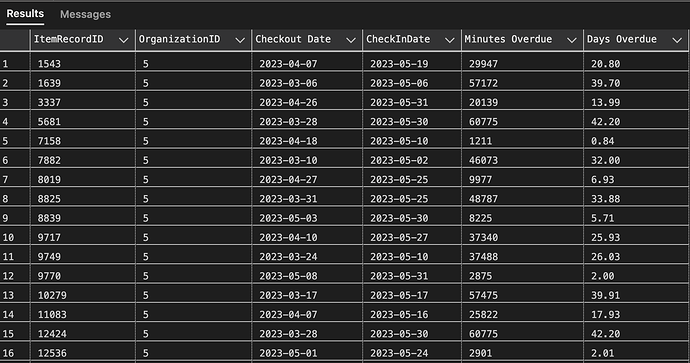No worries! But I’m going to go one better/further here. My boss pointed out to me that my original query doesn’t factor in auto-renewal activity which, honestly, I didn’t even think about.
So I rewrote and reconfigured the query to pull in a table of items that were auto-renewed which updates another table with updated checkout dates versus the original checkout dates. I also threw some quality of life stuff in there like titles, item barcodes, and patron info.
I’ll update the repo and Clearinghouse in just a few minutes.
-- Set a variable for our OrganizationID
DECLARE @OrgID INT = 5;
-- Create a table to hold Loan Period information
CREATE TABLE #TempLoanPeriodsMins (
LPID INT,
OrganizationID INT,
PatronCodeID INT,
LoanPeriodCodeID INT,
[Description] NVARCHAR(80),
TimeUnit INT,
Units INT,
LoanMinutes INT
)
-- Create a table to hold data about items checked in
CREATE TABLE #TempLoanedItems (
TransactionID INT,
PatronID INT,
ItemRecordID INT,
OrganizationID INT,
PatronCodeID INT,
LoanPeriodCodeID INT,
LPID INT,
LoanLength INT,
CheckInDate DATETIME,
CheckOutDate DATETIME
)
-- Create a table to hold data about all auto-renwals
CREATE TABlE #TempAutoRenewalsSetup (
TransactionID INT,
ItemRecordID INT,
PatronID INT,
CheckoutDate DATETIME
)
-- Create a table to hold data about the latest auto-renewals
CREATE TABLE #TempAutoRenewals (
TransactionID INT,
ItemRecordID INT,
PatronID INT,
CheckoutDate DATETIME
)
/* ----------------- */
-- Populate the Loan Period table
INSERT INTO #TempLoanPeriodsMins
SELECT
lp.LPID,
lp.OrganizationID,
lp.PatronCodeID,
lp.LoanPeriodCodeID,
lpc.Description,
lp.TimeUnit,
lp.Units,
((60 * 24) * lp.Units) AS LoanMinutes -- Converts the days to minutes
FROM
Polaris.Polaris.LoanPeriods lp WITH (NOLOCK)
INNER JOIN
Polaris.Polaris.LoanPeriodCodes lpc WITH (NOLOCK)
ON (lpc.LoanPeriodCodeID = lp.LoanPeriodCodeID)
WHERE --TimeUnit 1 = Days
lp.TimeUnit = 1
AND
lp.OrganizationID = @OrgID;
/* ----------------- */
-- Populate the #TempAutoRenewals table
INSERT INTO #TempAutoRenewalsSetup
SELECT
th.TransactionID,
item.numValue,
patron.numValue,
checkout.dateValue
FROM
PolarisTransactions.Polaris.TransactionHeaders th WITH (NOLOCK)
INNER JOIN -- Get the ItemRecordID
PolarisTransactions.Polaris.TransactionDetails item WITH (NOLOCK)
ON (th.TransactionID = item.TransactionID AND item.TransactionSubTypeID = 38)
INNER JOIN -- Get the PatronID
PolarisTransactions.Polaris.TransactionDetails patron WITH (NOLOCK)
ON (th.TransactionID = patron.TransactionID AND patron.TransactionSubTypeID = 6)
INNER JOIN -- Get the checkout date
PolarisTransactions.Polaris.TransactionDetails checkout WITH (NOLOCK)
ON (th.TransactionID = checkout.TransactionID AND checkout.TransactionSubTypeID = 186)
INNER JOIN -- Get the auto-renewal status
PolarisTransactions.Polaris.TransactionDetails autorenew WITH (NOLOCK)
ON (th.TransactionID = autorenew.TransactionID AND autorenew.TransactionSubTypeID = 145)
WHERE -- Check out
th.TransactionTypeID = 6001
AND -- Item was auto-renewed
autorenew.numValue = 48
AND -- Set your first date to be at least two months back from your first target date
th.TranClientDate BETWEEN '2023-03-01 00:00:00.000' AND '2023-05-31 23:59:59.999'
/* ----------------- */
-- Populate the table of most recent auto-renewals
INSERT INTO #TempAutoRenewals
SELECT
TransactionID,
ItemRecordID,
PatronID,
MAX(CheckoutDate) -- Use only the latest auto-renewal checkout date
FROM
#TempAutoRenewalsSetup
GROUP BY
TransactionID,
ItemRecordID,
PatronID
-- Populate a table of items checked in
INSERT INTO #TempLoanedItems
SELECT
th.TransactionID,
patron.numValue,
item.numValue,
th.OrganizationID,
patroncode.numValue,
cir.LoanPeriodCodeID,
(SELECT LPID FROM Polaris.Polaris.LoanPeriods lp WITH (NOLOCK)
WHERE lp.LoanPeriodCodeID = cir.LoanPeriodCodeID
AND lp.OrganizationID = th.OrganizationID
AND lp.PatronCodeID = patroncode.numValue) AS LPID,
loanlength.numValue,
checkindate.dateValue,
DATEADD(MINUTE, -loanlength.numValue, checkindate.dateValue) AS CheckOutDate
FROM
PolarisTransactions.Polaris.TransactionHeaders th WITH (NOLOCK)
INNER JOIN -- Pulls PatronID
PolarisTransactions.Polaris.TransactionDetails patron WITH (NOLOCK)
ON (th.TransactionID = patron.TransactionID AND patron.TransactionSubTypeID = 6)
INNER JOIN -- Pulls ItemRecordID
PolarisTransactions.Polaris.TransactionDetails item WITH (NOLOCK)
ON (th.TransactionID = item.TransactionID AND item.TransactionSubTypeID = 38)
INNER JOIN -- Need the LoanPeriodCodeID
Polaris.Polaris.CircItemRecords cir WITH (NOLOCK)
ON (cir.ItemRecordID = item.numValue)
INNER JOIN -- Pulls the loan length in minutes
PolarisTransactions.Polaris.TransactionDetails loanlength WITH (NOLOCK)
ON (th.TransactionID = loanlength.TransactionID AND loanlength.TransactionSubTypeID = 323)
INNER JOIN -- Gets the patron code
PolarisTransactions.Polaris.TransactionDetails patroncode WITH (NOLOCK)
ON (th.TransactionID = patroncode.TransactionID AND patroncode.TransactionSubTypeID = 7)
INNER JOIN -- Gets the date the item was checked in
PolarisTransactions.Polaris.TransactionDetails checkindate WITH (NOLOCK)
ON (th.TransactionID = checkindate.TransactionID AND checkindate.TransactionSubTypeID = 185)
WHERE -- Check in
th.TransactionTypeID = 6002
AND -- Adjust dates as needed
th.TranClientDate BETWEEN '2023-05-01 00:00:00.000' AND '2023-05-31 23:59:59.999'
AND
th.OrganizationID = @OrgID
AND -- Excludes oddities like circ-on-the-fly etc.
loanlength.numvalue > 0;
-- Update #TempLoanedItems to reflect renewal dates from #TempAutoRenewals
UPDATE
#TempLoanedItems
SET
#TempLoanedItems.CheckOutDate = #TempAutoRenewals.CheckoutDate
FROM
#TempAutoRenewals
WHERE
#TempLoanedItems.PatronID = #TempAutoRenewals.PatronID
AND
#TempLoanedItems.ItemRecordID = #TempAutoRenewals.ItemRecordID
AND
#TempAutoRenewals.CheckoutDate > #TempLoanedItems.CheckOutDate;
-- Deliver the data
SELECT
tli.ItemRecordID,
cir.Barcode AS [Item Barcode],
br.BrowseTitle AS [Title],
tli.PatronID,
p.Barcode AS [Patron Barcode],
pr.PatronFullName AS [Patron Name],
CAST(tli.CheckoutDate AS DATE) AS [Check Out Date],
CAST(tli.CheckInDate AS DATE) AS [Check In Date],
DATEDIFF(DAY, tli.CheckOutDate, tli.CheckinDate) AS [Days Out],
lp.Units [Item Loan Period in Days],
(DATEDIFF(DAY, tli.CheckOutDate, tli.CheckinDate) - lp.Units) AS [Days Overdue]
FROM
#TempLoanedItems tli
INNER JOIN -- Get Loan Period info
Polaris.Polaris.LoanPeriods lp WITH (NOLOCK)
ON (lp.LPID = tli.LPID)
INNER JOIN -- Get item record info
Polaris.Polaris.CircItemRecords cir WITH (NOLOCK)
ON (cir.ItemRecordID = tli.ItemRecordID)
INNER JOIN -- Get title info
Polaris.Polaris.BibliographicRecords br WITH (NOLOCK)
ON (br.BibliographicRecordID = cir.AssociatedBibRecordID)
INNER JOIN -- Get patron registration info
Polaris.Polaris.PatronRegistration pr WITH (NOLOCK)
ON (pr.PatronID = tli.PatronID)
INNER JOIN -- Get paton barcode
Polaris.Polaris.Patrons p WITH (NOLOCK)
ON (p.PatronID = tli.PatronID)
WHERE
(DATEDIFF(DAY, tli.CheckOutDate, tli.CheckinDate) - lp.Units) > 0
ORDER BY
(DATEDIFF(DAY, tli.CheckOutDate, tli.CheckinDate) - lp.Units) DESC
-- Tidy up
DROP TABLE #TempLoanedItems;
DROP TABLE #TempLoanPeriodsMins;
DROP TABLE #TempAutoRenewalsSetup;
DROP TABLE #TempAutoRenewals;
